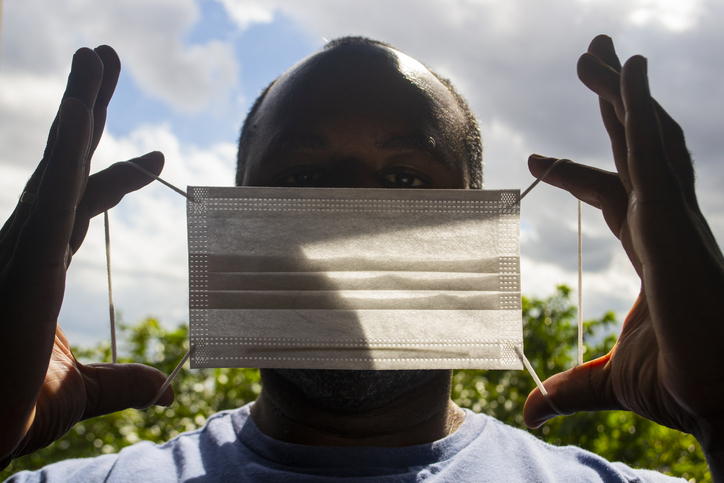On April 3, 2020, the Centers for Disease Control (CDC) made a statement encouraging all Americans to wear cloth face coverings upon leaving their homes. In response, Black men have expressed their concern about such a recommendation. Their concern is based in that wearing masks could expose them to racial profiling and harassment from law enforcement officers. An example of such concern can be seen in the Twitter posting of Aaron Thomas, a Black man living in Ohio: “I don’t feel safe wearing a handkerchief or something else that isn’t CLEARLY a protective mask covering my face to the store because I am a Black man living in this world. I want to stay alive but I also want to stay alive.” Such a tweet has been reposted more than 18,000 times since its original posting. Based on his statement, Thomas has decided to not wear a mask so that he can “stay alive.”
This concern has not been unwarranted. A month before the CDC provided its recommendation, two Black men posted a video of themselves on YouTube being escorted out of a Walmart in Wood River, Illinois by a police officer for allegedly “wearing surgical masks.” One of the men stated that: “[The policeman] followed us from outside, told us that we cannot wear masks. This police officer just put us out for wearing masks and trying to stay safe.” The chief of the Wood River police, Brad Wells, stated later in a news release that the police officer in the video “incorrectly” told such men that a city law prohibited the wearing of masks. Chief Wells went on to state: “This statement was incorrect and should not have been made. The city does not have such an ordinance prohibiting the wearing of a mask. In fact, I support the wearing of nonsurgical mask or face covering when in public during the COVID-19 pandemic period.” As a result of the two men filling a complaint, Chief Wells told The Washington Post that an internal investigation of the incident has begun with the assistance of the local NAACP branch.
Georgia Senator, Nikema Williams, wrote a letter to the state’s governor urging him to temporarily suspend the mask laws. She explains why in her letter, stating that her husband, who is African American, 6’3”, and weighs 300 pounds: “was telling [her] how uncomfortable it was to wear a mask in stores because folks get intimidated and look at him like he’s up to no good.”
Black men have also experienced racial profiling when not wearing a mask. In April of 2020, a video from Philadelphia filmed a Black man being removed with force by four police officers one day after the city’s transportation authority required all riders of buses, trolleys, and trains to wear face coverings. After the incident, the transportation authority made an announcement deeming face coverings no longer required for riders.
Therefore, it has been found that both Black men who follow and do not follow the CDC recommendation to wear a face covering have experienced episodes of harassment. Blacks are already at an increased risk of contracting the virus, but now Black men in particular are faced with the dilemma to wear a mask to save their lives from either racial profiling or the raging COVID-19 pandemic.
Like several senators, the NAACP has also made a statement urging states to indefinitely stop their mask laws. Marc Banks, the NAACP’s national press secretary, stated: “No person should be fearful of engaging in lifesaving measures due to racialism.”
Melanye Price is a political science professor at Texas’ Prairie View A&M University. She tells The New York Times that the well-intentioned recommendation to wear masks or bandanas actually can put African Americans at greater risk of racial profiling. According to Kevin Gaines, a professor of civil rights and social justice at the University of Virginia, Black men are already being profiled by the police on a regular basis, but wearing masks heightens such risks of profiling. The initial assumption is not made that Black men are wearing masks to protect themselves and those around them from the threat of the virus. However, in contrast, it is assumed that they are engaging in some type of ill will like stealing or other crimes.
As a result of the risks of racial profiling, some Black men have changed their style of dress in an effort to appear less threatening. STAT correspondent Usha Lee McFarling reports that Black men have attempted to “tone down their appearance to lower suspicion.” Examples of such “toning down” comes in the form of wearing college T-shirts and “dressing like prospects, not suspects.” This has even been found in their choice of mask colors and patterns, choosing floral prints or plain white masks over others.
Vickie Mays, a professor of heath policy and management at UCLA, has been attempting to track situations in which Black men wearing masks have suffered harassment. Mays tells STAT that Black men should wear masks despite the risk of racial profiling in order to, foremost, protect their health. However, she suggests that such masks not be dark in color or “ominous looking.” Instead, she suggests they be bright in color or have traditional African prints. Mays also urges health officials to swiftly procure professionally-made masks for Black communities just as they would any other commodity like food or water as this population has been reportedly experiencing greater rates of COVID-19 infection than non-minority groups.
- Addressing the Minds and Bodies of Minorities: How the Covid-19 Pandemic Has Compounded Behavioral Health Issues - May 21, 2021
- Taking a Look at Covid-19 Vaccine Research Minority Representation—Key to Increasing Minority Vaccination - May 13, 2021
- Black Men and the Dilemma of Wearing Masks During the COVID-19 Pandemic - August 18, 2020



